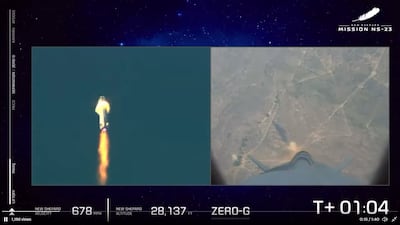Blue Origin, the company owned by billionaire Jeff Bezos, is set to carry out its first space flight since a rocket exploded during an uncrewed mission in 2022.
A launch window is available next week, starting on December 18, the company said.
Blue Origin's New Shepard rocket will blast off from a West Texas desert, carrying research work into suborbital space.
"We’re targeting a launch window that opens on December 18 for our next New Shepard payload mission," the company posted on X, formerly known as Twitter, on Tuesday.
"NS-24 will carry 33 science and research payloads as well as 38,000 @clubforfuture postcards to space."
Rocket failure
The explosion of the NS-23 mission last September was blamed on an engine nozzle failure that caused the rocket to overheat.
The mission was aborted mid-flight, only one minute into launch.
But the crew capsule escape system worked as it should, bringing the payloads back to ground with a parachute-assisted landing.
No passengers were on board the mission, which was carrying 36 payloads from schools, research institutions and pupils around the world.
The US Federal Aviation Administration launched an investigation into the incident, causing New Shepard flights to be paused. It was closed on September 27, 2023.
"The FAA required Blue Origin implement 21 corrective actions to prevent mishap reoccurrence, including redesign of engine and nozzle components to improve structural performance during operation as well as organisational changes," the report by the authority said at the time.
Space tourism flights
The company has flown 32 people since beginning operations of its space tourism flights in 2021.
Mr Bezos flew on the first crewed flight in July 2021, along with 82-year-old aviation pioneer Wally Funk.
The late British billionaire Hamish Harding, who lived in Dubai, became the first space tourist from the UAE when he flew on a Blue Origin rocket last year.
He was one of the five people who died on the Titan submersible's voyage to the Titanic shipwreck in the Atlantic Ocean earlier this year.
The Blue Origin flights offer a 10-minute experience.
Once the spacecraft separates from the booster, it soars 106 kilometres above ground, bringing the passengers views of Earth against the darkness of space.
The reusable booster lands back at the launch site.
The capsule then descends towards the Texas desert under three parachutes, bringing the passengers safely back to ground.
Blue Origin has never publicly revealed the ticket cost for a seat on its flights, but some reports say that it can go up to $1.25 million.
Virgin Galactic, owned by Sir Richard Branson, also offers space tourism flights, with a ticket reportedly priced at $450,000.
Passengers can expect about a 70 to 90-minute flight experience on Virgin Galactic.
A mother ship carries the VSS Unity spaceplane to an altitude high enough for it to be released and then it flies to the boundary of space.
Passengers experience about four minutes of weightlessness, before the plane returns to Earth for a landing on a runway in a New Mexico desert.







